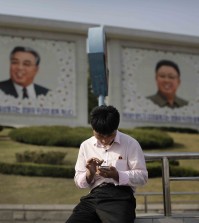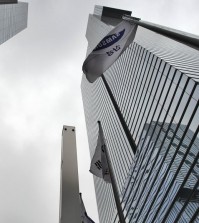- California Assembly OKs highest minimum wage in nation
- S. Korea unveils first graphic cigarette warnings
- US joins with South Korea, Japan in bid to deter North Korea
- LPGA golfer Chun In-gee finally back in action
- S. Korea won’t be top seed in final World Cup qualification round
- US men’s soccer misses 2nd straight Olympics
- US back on track in qualifying with 4-0 win over Guatemala
- High-intensity workout injuries spawn cottage industry
- CDC expands range of Zika mosquitoes into parts of Northeast
- Who knew? ‘The Walking Dead’ is helping families connect
Kakao trapped in growth dilemma
By Choi Kyong-ae
Kakao Corp. is seeking a breakthrough in overseas markets as it experiences a growth decline in its native Korean market.
But Korea’s leading messaging app company will likely have an uphill battle in the world’s mobile instant messaging markets, dominated by bigger rivals such as the U.S.’s WhatsApp, China’s Tencent Holdings and Korea’s Naver Corp.
“We will increasingly partner with a local company to make a foray into a new market and offer customized applications to woo local subscribers,” a Kakao official said by telephone.
In the long-term, this approach will differentiate Kakao from Naver and other big competitors which conduct mass marketing and mass distribution of applications, the official said, asking not to be named.
Will it be possible for Kakao to make a difference in a seemingly David vs. Goliath battle?
Kakao launched the free-to-download Kakao Talk messaging app in March 2010 and the chat platform was widely received by smartphone users. Its messaging app’s subscriber base grew to 130 million globally in early December, up from 73 million in early January.
Lack of profit drivers, however, forced the company to post widened net losses for three consecutive years through 2011. Its net loss snowballed to 15.26 billion won ($14.5 million) in 2011 from 1.71 billion won in 2009.
Mobile games such as Anipang and the “Plus Friend” service that connects the chat platform users to their favorite brands, such as Uniqlo and McDonald’s, helped Kakao turn around last year. It reported a net profit of 7 billion won for 2012.
Still, analysts advised Kakao to go beyond the domestic market where nearly 90 percent of the 37 million smartphone users already chat over Kakao Talk, play games and buy stickers on the chat platform.
“It is very important for Kakao to go to countries which do not have a dominant messaging app provider, but has a growing number of mobile phone users,” Hong Jonggil, an analyst at Korea Investment & Securities, said.
Less-developed markets in terms of messaging apps include Southeast Asia, India, Russia and Latin America, Hong said, adding China and the U.S. are dominated by local players such as WeChat and WhatsApp, respectively.
Analysts also asked Kakao to strengthen its network systems to avoid any major disruption like the one that took place on Tuesday. The Kakao Talk service was not available for 50 minutes that morning.
“If network systems remain unstable, it will deal a heavy blow to Kakao’s competitiveness,” said the analyst.
Meanwhile, the Line messaging app had attracted 300 million subscribers as of Nov. 25 since its launch in June 2011. The WeChat app recently topped the mobile messaging market with 600 million subscribers.
Naver, Korea’s biggest search engine, posted a 31-percent growth in sales for the third quarter that ended Sept. 30 at 585 billion won helped by increased revenue from mobile games and stickers.
Now, Kakao’s growth opportunity overseas seems to depend on how it communicates with local mobile phone users and rolls out customized services.
















